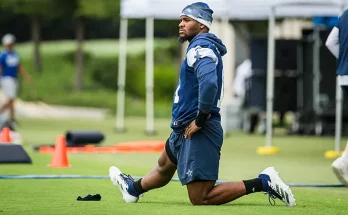From the dusty roads of Fairmont, West Virginia, to the gleaming heights of college football immortality, the story of Nick Saban is not just one of victories and titles—it’s a story of grit, growth, and relentless pursuit of excellence. Now officially enshrined in the College Football Hall of Fame, Saban’s name is etched in stone, but his legacy has long been etched in the hearts of generations of players, coaches, and fans who witnessed his evolution from a hard-nosed kid working at his father’s gas station into the greatest college football coach the sport has ever known.
It all started humbly. In a small West Virginia town, Nick Saban learned early what it meant to work for something. Helping out at his father’s service station taught him more than just how to rotate tires or pump gas—it taught him discipline, attention to detail, and above all, standards. These were the seeds that would later blossom into the “Process” that became synonymous with the Alabama dynasty. Saban didn’t grow up with dreams of becoming the winningest coach in college football history. But every task, every challenge, and every lesson instilled in him a foundation of purpose.
After playing defensive back at Kent State and starting his coaching career as a graduate assistant there, Saban embarked on a journey that was far from glamorous. He bounced around as an assistant at schools like Syracuse, West Virginia, Ohio State, Navy, and Michigan State before finally landing his first head coaching gig at Toledo in 1990. But even there, it wasn’t the victories that stood out—it was the vision. He was already beginning to develop the meticulous, no-shortcuts approach that would define his coaching life.
When he took over at Michigan State in 1995, Saban stepped into a program plagued by inconsistency and mediocrity. Over five years in East Lansing, he didn’t post any undefeated seasons or win major titles. But he did something more important—he learned how to build. Brick by brick. He endured setbacks. He made mistakes. And he grew. It’s easy to celebrate someone’s triumphs in retrospect, but the foundation of Saban’s future greatness was laid during those tough years. It was there that he learned how to lead men, how to rebuild cultures, and how to embrace the process instead of chasing results.
In 2000, he made the leap to LSU—and that’s where the magic truly began. In just four seasons, he turned the Tigers into national champions, capturing the 2003 BCS National Championship and bringing LSU its first national title since 1958. He did it not with flash or gimmicks, but with structure, accountability, and relentless preparation. At LSU, Saban began to perfect his now-famous “Process”—a mindset that prioritized daily discipline over scoreboard obsession. It was no longer about winning games; it was about mastering every detail, every rep, every meeting, every drill. That approach didn’t just elevate LSU—it changed the entire SEC.
But even after reaching the mountaintop, Saban wasn’t done. In 2005, he shocked the college football world by leaving Baton Rouge for the NFL, becoming head coach of the Miami Dolphins. Some saw it as a mistake; others saw it as ambition. For Saban, it was another step in the journey. His two seasons in Miami didn’t end in Super Bowl glory, but they served their purpose. They refined his approach. They exposed him to new leadership dynamics. And perhaps most importantly, they reaffirmed where he truly belonged.
When Nick Saban returned to college football in 2007 to take the helm at Alabama, he arrived not just as a coach, but as a seasoned architect of transformation. He came to Tuscaloosa with a blueprint, but also with battle scars. He had experienced failure. He had made tough calls. And he had developed a system unlike anything the sport had seen before. That combination—experience and vision—proved explosive.
What followed was one of the most dominant eras in the history of college athletics. Under Saban’s leadership, Alabama won six national championships between 2009 and 2020. He transformed the Tide into a machine of excellence, year after year. But it wasn’t just about the trophies. It was the way he did it. Every player, every coach, every staff member operated under the same creed: commit to the process. Focus on the work. Master the details. The results will take care of themselves.
Saban’s influence went far beyond the scoreboard. His coaching tree became a sprawling network of proteges who carried his philosophy to programs across the country. Kirby Smart, Jimbo Fisher, Lane Kiffin, Steve Sarkisian, Mel Tucker, and dozens more passed through the crucible of Saban’s program and went on to lead their own teams. His fingerprints are all over the modern game.
And what made Saban’s run even more remarkable was his ability to evolve. Unlike many great coaches who found a system and stuck with it, Saban adapted. He embraced change. He hired innovative minds. He transitioned from a run-heavy, defense-first philosophy to a high-octane, spread-attack offense that matched the game’s changing tempo. He didn’t just survive the evolution of college football—he led it.
For over a decade, Alabama was the standard. It wasn’t just the titles—it was the relentless consistency. Ten-win seasons became routine. Top-ranked recruiting classes stacked one after another. And with each year, Saban didn’t just coach football—he built men. His program emphasized personal growth, academic success, and character development. His expectations extended far beyond the field.
But behind all the accolades and All-Americans was a man still grounded in the lessons he learned as a kid in West Virginia. Work hard. Do things the right way. Be accountable. Whether in a film room or a locker room, at a podium or on the sideline, Saban never lost sight of what truly mattered.
Now, with his enshrinement in the College Football Hall of Fame, Nick Saban receives the ultimate recognition. But he likely wouldn’t frame it that way. To him, it’s not about personal glory. It’s about the journey—the grind, the growth, the opportunity to affect lives. He never coached for the applause. He coached for the impact.
And that, perhaps more than any stat or trophy, is what cements his status as the greatest of all time.
He was not born a legend. He became one. Through failure. Through learning. Through relentless focus and unshakable values. He walked a road that spanned decades, littered with challenges, missteps, and moments of reflection. And yet, through it all, he never wavered from the process.
As the next generation of coaches steps into the spotlight, many will search for shortcuts, silver bullets, or fast fame. But they’d be wise to study the road Nick Saban walked. It wasn’t always easy. It wasn’t always pretty. But it was always intentional.
And in the end, it produced the most formidable coaching legacy the sport has ever known.
So as fans, players, and peers alike honor his induction into the Hall of Fame, let it serve as a reminder of what true greatness requires. Time. Patience. Purpose. A vision that outlasts setbacks. And a relentless commitment to doing things the right way.
Congratulations, Coach Nick Saban. A life’s work, masterfully executed. A legacy, forever etched into the soul of the game.



